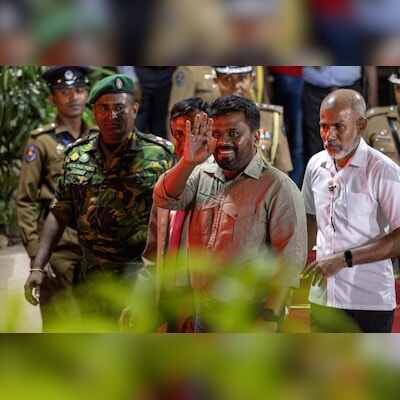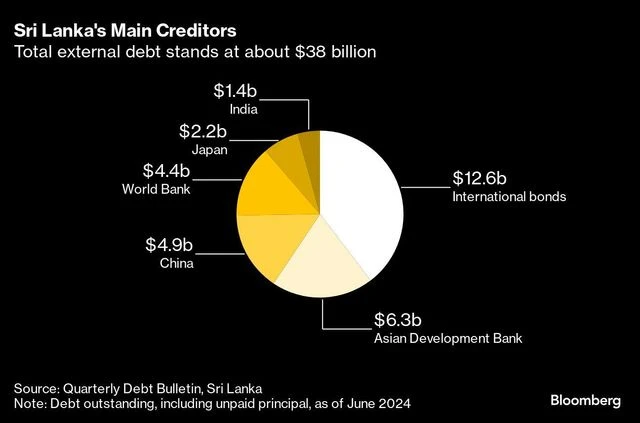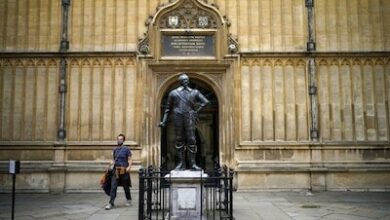Sri Lanka’s leftist President Dissanayake takes office as IMF worries grow | External Affairs Defence Security News

)
Anura Dissanayake, Srilanka President | Credit: X/@@anuradisanayake
Sri Lanka’s new leftist president was sworn into office Monday after ousting the country’s elites who voters had blamed for bankrupting the nation and imposing harsh austerity measures linked to an International Monetary Fund bailout.
Anura Kumara Dissanayake, popularly known as AKD, took his oath of office in Colombo on Monday, vowing to work with others to achieve his goals of clean governance.
“We do not believe that this deep crisis can be overcome by a government, a party or an individual,” he said. “I am not a magician, I am an ordinary citizen born in this country. My main task is to absorb skills, absorb knowledge, and take the best decisions to guide the country.”
The new president has vowed to reopen negotiations with the IMF over its $3 billion bailout, which came with spending cuts and tax hikes that proved deeply unpopular with voters. Some members of his National People’s Power coalition also oppose debt restructuring terms agreed to with the nation’s creditors.
Sri Lanka’s dollar bonds due in 2027 and 2029 fell by the most in over two years on Monday. The rupee inched higher against the dollar, rising with stocks as investors hope the new leader will stick with the IMF program.
)
Earlier Monday, Prime Minister Dinesh Gunawardena resigned from his post, thereby dissolving the previous cabinet and allowing Dissanayake to make his own appointments. The new president is now expected to dissolve the parliament soon and call for fresh elections to choose lawmakers. His coalition currently has only three members in the 225-seat parliament, including himself.
Dissanayake will need to appoint a replacement for his parliamentary seat before setting up his own cabinet, or forming a caretaker government. Under the constitution, Sri Lanka must hold parliamentary elections by mid-2025, and under the nation’s executive system, the president can hold multiple cabinet portfolios.
The victory for Dissanayake, who secured only 3 per cent of the vote when he last ran for president in 2019, shows the depth of frustration with a political elite that triggered the government’s first default in its history. The economic crisis culminated in street protests that ousted former leader Gotabaya Rajapaksa.
Under Wickremesinghe, who was appointed by parliament after the uprising, inflation slowed to low single-digits from nearly 70 per cent, borrowing costs fell, debt was restructured and the economy posted faster-than-expected growth. But the island nation’s 22 million people have felt the pain with higher taxes and electricity prices.
Dissanayake now faces the challenge of following through on his economic pledges while maintaining stability in the economy and keeping IMF bailout funds flowing. Although he has not spelled out his plan on the IMF deal in detail, his backers have said he plans to seek modifications without throwing out existing terms altogether.
“We are staying with the program but will look for modifications,” Rizvie Salih, an executive committee member of Dissanayake’s NPP coalition, said on Saturday. “Even the IMF has said they are open to new ideas, proposals.”
In a report published Monday, Bloomberg Economics said Dissanayake’s proposed tax-relief measures pose a risk to the IMF’s fiscal targets “if implemented fully.” In the end, however, the economists wrote that his administration would likely take a pragmatic approach that avoids a standoff with the IMF.
“We think Dissanayake will soften his stance and dilute his tax-cut proposals to fit them within the fiscal space available and any concessions provided by the IMF,” they wrote.
The incoming president pledged other economic measures on the campaign trail, including an increase in tax exemptions and more “equitable” tax rates and brackets. He’s seeking more oversight on government spending and cleaner governance. Dissanayake has also said he may cancel a proposed wind power project by India’s Adani Group amid claims of a lack of transparency and uncompetitive pricing.
Foreign Policy
On foreign policy, Dissanayake faces the challenge of juggling the competing interests of China and India, strategic rivals who’ve been major investors. Some analysts have said Dissanayake may be more likely to favor China given his party’s Marxist roots, although he also paid a visit to New Delhi at the invitation of India’s government earlier this year.
Both the US and India congratulated Dissanayake and said they’ll work with him to bolster ties. The US is committed to supporting Sri Lanka as it builds a stable society, State Department Spokesman Matthew Miller said in a statement Sunday. Prime Minister Narendra Modi said Sri Lanka holds a “special place” in India’s neighborhood-first policy. Dissanayake replied to Modi’s comments in an X post, saying he shared India’s commitment in strengthening ties.
China also congratulated Dissanayake on his win. On Monday, President Xi Jinping sent a message to the new president pointing out that the two sides have long been friendly neighbors, and said he looks forward to further promoting cooperation in Beijing’s Belt and Road infrastructure initiative, according to a China Central Television report.
Dissanayake got his political start as a student leader in his party, the Janatha Vimukthi Peramuna. The party was once known for violent Marxist uprisings in the 1970s and 1980s, but has since renounced violence, with Dissanayake positioning himself as a center-left figure. He became the party’s head in 2014 and has included civil society leaders and academics in the group to appeal to a broader section of the country.
The party has shifted away from its anti-capitalist roots and briefly joined coalition governments. Still, the JVP leadership is untested as administrators, and the coalition that it leads has only three members in the 225-seat parliament.
(Only the headline and picture of this report may have been reworked by the Business Standard staff; the rest of the content is auto-generated from a syndicated feed.)
First Published: Sep 23 2024 | 11:35 PM IST




